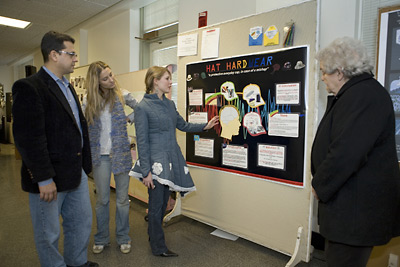Senior citizens collaborate with textile students to develop high-tech products that help the elderly
By Sara Ball

A garment for seniors that is wired to contact a doctor in a medical emergency. A fashionable shoe for an older woman's taste that can regulate temperature. A lightweight, collapsible walker made of textiles that can convert to a chair. These are a few of the products devised in a Cornell course in which students collaborated with community senior citizens to conceptualize products using high-tech textiles to aid older people.
The class is the first of a series of intergenerational courses sponsored by the Living Environments Aging Partnership (LEAP), which is funded by the Foundation for Long Term Care and the Corporation for National and Community Services.
Lifewear, for example, is an undergarment that allows the wearer to communicate emergencies to a doctor from home. Students designed a female camisole and male undershirt with conductive polymers to make it fully washable and flexible.
"Working with community elders through LEAP gave us a different lifestyle perspective," said graduate student Ellan Spero, who worked on the Lifewear design. "We're used to carrying technology with us, but they tell us what they would actually use or include in their daily lives."
LEAP, led by Nancy Wells, assistant professor of design and environmental analysis, will provide funds for intergenerational classes every semester for the next three years. Each class will focus on interactively improving a different aspect of environments for older adults.
"The students actually combined fashion with function," said Assistant Professor Juan Hinestroza, who co-taught the course Textiles, Apparel and Innovation (TXA 466) with Professor Susan Ashdown. Hinestroza's research applies nanotechnology to textiles, making new-age versions of old technologies.
Jane Foley '08, who helped design an elegant black flat shoe that has supportive insoles and a temperature-regulating material so it can be worn day to evening, said, "We looked at competitors like Merrell, Keen and Orthopedic, but we couldn't find a combination of comfort and fashion in any other."
The so-called Carol Shoe is just that. It is made of a breathable neoprene fabric (Stomatex), the same lightweight, nonporous polyester used in some sports clothing.
"We had to find what's fashionable for 65-plus women," said Melanie Espeland '08, who also helped design the Carol Shoe.
Students and their older collaborators, who came to class about once every two weeks, designed surveys to determine what elders find fashionable and how they feel about technology. They used the responses to improve their designs.
Meg Cross '08 worked in a group that invented the innovative Walk and Roll. "It's designed to enhance the autonomy of the person using it," said Cross. Made entirely of textiles, Walk and Roll is a lightweight walker with a seat and built-in storage compartments. And it folds up to fit in a car.
"The wheels and the materials make it easy to manipulate so you have more control. You can basically control everything while you're standing up," said Rena Gower '08, another Walk and Roll group member.
Louise Watt, an older collaborator on the walker project, moved into a skilled nursing facility less than two years ago when she had operations on both her legs. After intense physical therapy, she can now walk with a walker and was glad to help students design a better one. "I tried to give them my expertise," Watt said. "I'm very interested in this. It's given me some new thoughts up here," she said, pointing to her head. The class also has inspired her, she said, to resume her lifelong hobby of painting, which she had abandoned since her surgeries.
Katherine Buckner '07 liked the class, she said, because, "It used technology design and functional apparel; it was a problem-solving class."
Next semester, the LEAP courses will be Environments for Elders (DEA 472) and Furniture as a Social Art (DEA 430).
Graduate student Sara Ball is a writer intern at the Cornell Chronicle.
Media Contact
Get Cornell news delivered right to your inbox.
Subscribe